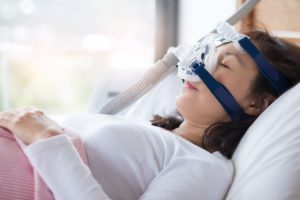 If you need a CPAP machine to treat your sleep apnea, Philips has been a trusted brand for decades. Unfortunately, 2 million people just learned their BiPAP and CPAP machines have been recalled. If your Philips Respironics device is on the list, you’re left with a tough decision. Do you continue using your CPAP or go without any treatment until your replacement arrives? You don’t have to lose sleep at night because you have another option. An oral appliance can be just what you need to breathe easier without risking your health.
If you need a CPAP machine to treat your sleep apnea, Philips has been a trusted brand for decades. Unfortunately, 2 million people just learned their BiPAP and CPAP machines have been recalled. If your Philips Respironics device is on the list, you’re left with a tough decision. Do you continue using your CPAP or go without any treatment until your replacement arrives? You don’t have to lose sleep at night because you have another option. An oral appliance can be just what you need to breathe easier without risking your health.
Philips Respironics Recalls CPAP Machines
Obstructive sleep apnea is a condition that affects over 22 million Americans. The sleep disorder occurs when there are frequent pauses in breathing from a blockage in the airway. Often, it is caused by the soft tissues in the back of the mouth or tongue obstructing airflow. A CPAP delivers a steady stream of air pressure through a mask worn over the nose to keep the airway open.
Philips Respironics has recalled multiple sleep apnea machines because the foam inside of the devices used to reduce vibrations can break down. The small particles can be inhaled, leading to short-term and long-term health issues. Inhaling them can cause several complications, like shortness of breath, allergic reactions, headaches, or skin irritation. Some people have even reported nausea and vomiting. Over time, inhaling the chemicals can increase your risk of asthma and issues with your liver or kidneys.
Philips is committed to replacing or repairing any devices within 1 year, but they are advising some people to stop using their CPAP in the meantime. Others are choosing to use their device because the benefits surpass the potential risks.
If your CPAP is part of the recall, talk to your physician about an alternative option, like oral appliance therapy.
Sleep Soundly with Oral Appliance Therapy
Oral appliance therapy is proven effective in treating mild-to-moderate cases of obstructive sleep apnea. The small custom-fit device may look like an athletic mouthguard, but it does more than protect the teeth. The appliance repositions the lower jaw or tongue to prevent the soft tissues from blocking the airway. When used correctly, it can reduce sleep apnea symptoms by over 90% by preventing interruptions in breathing.
Although CPAPs are the traditional treatment for sleep apnea, the FDA and the American Academy of Sleep Medicine support the use of oral appliances due to their various advantages, such as:
- Noticeable improvement in symptoms.
- Customized to your specific needs.
- Comfortable and durable.
- Lightweight and portable.
- Easy maintenance and care.
- No noise or attachments.
- Better patient compliance.
- Affordable.
Don’t toss and turn worrying about your recalled CPAP. Contact your sleep dentist today to see if oral appliance therapy is right for you.
About Dr. Glenn Thompson
Dr. Thompson earned his dental degree from the Tufts University School of Dental Medicine before continuing his training in obstructive sleep apnea treatments, like oral appliance therapy. If you’re ready to cut ties with your CPAP, contact our office today to schedule your consultation.